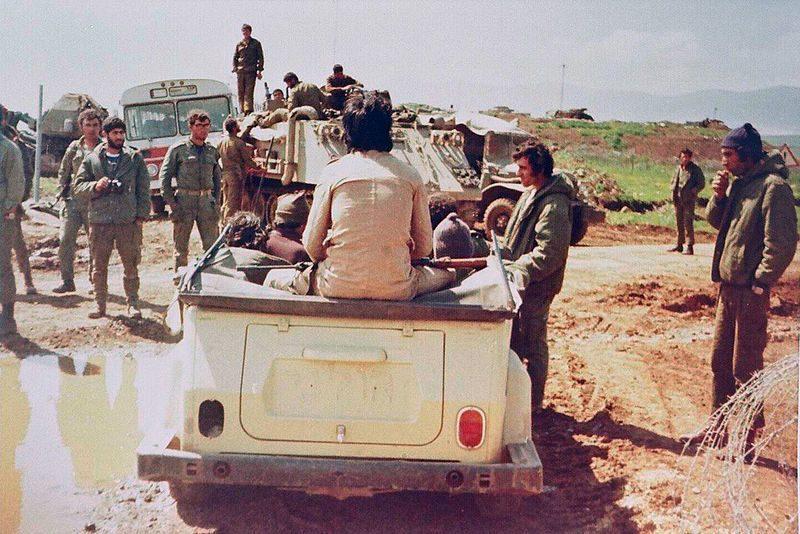Remembering the Israeli withdrawal from south Lebanon

On this day in 1978, Israeli military forces finally withdrew from Lebanon three months after their invasion of southern Lebanon in an effort to hunt down and eliminate the Palestinian Liberation Organisation (PLO). It was essentially an extension of the Israeli-Palestinian conflict spread into neighbouring borders, drawing in multiple other players and forming the catalyst for future incursions into Lebanese territory
What: Israeli military withdrawal from southern Lebanon
When: 13 June 1978
Where: Southern Lebanon
What happened?
On the night of 14 March 1978, the Israeli military launched a major invasion of southern Lebanon after the death of around 30 Israelis in an attack which took place two days earlier on the coast of Israel from the city of Haifa to Tel Aviv. Responsibility for the attack was claimed by Fatah, which was based in south Lebanon after its expulsion from Jordan in 1970.
Despite the invasion being widely regarded as retaliation for the raid into Israel, it was more broadly conducted with the goal of eradicating the bases of the Palestinian resistance groups in the region and to establish a security zone extending around six miles into Lebanese territory, as was asserted by Israeli spokesmen the following day. Later that same day, Israeli Defence Minister Ezer Weizman announced at a press conference that the operation was launched “to clear this infested area once and for all” and warned that Israel would continue to occupy the area until it was sure that the PLO could no longer strike Israel.
In addition to the 20,000-25,000 Israeli ground troops backed by tanks, artillery, fighter planes and gunboats, a number of Lebanese Christian militias also supported the Israeli invasion and joined forces with them. These militias, the most prominent of which was the South Lebanon Army (SLA), had been formed during the Lebanese civil war and the subsequent collapse of the country’s military in 1976, and numbered around 1,500 to 2,500.
By the end of the first day of the invasion, Israeli forces overran at least five Palestinian positions south of the Litani River, and what followed was the bombing of the port of Tyre on claims that the PLO was receiving arms from there. The surrounding refugee camps were targeted because Israel alleged they were being used as training bases. The PLO had anticipated the Israeli attacked and withdrew most of its forces, leaving only around one-fifth of the original 5,000 fighters in southern Lebanon.
The alliance of the Israeli army and the Christian militias proved disastrous for the Palestinian refugee population and the Muslim population overall, with the widespread looting of villages overrun by the invasion and the reported massacre of around 70 Muslims taking shelter in a mosque in the town of Khiam.
International condemnation of the Israeli invasion broke out, particularly from the Arab states, and the Lebanese government immediately made a formal complaint to the United Nations Security Council to send an international peacekeeping force to the area. With its goals in southern Lebanon having been accomplished, the Israeli government declared a ceasefire on 21 March, amid continued calls for military withdrawal by the international community, including from the US, Britain and other Western nations. After a series of negotiations with the UN, the Israeli military finally withdrew its last ground troops from Lebanon.
What happened next?
A newly set-up international force called the United Nations Interim Force in Lebanon (UNIFIL) was handed the territory south of the Litani River following the Israeli withdrawal, with the force intending to stay for a six month period on Israel’s conditions that the area “will no longer serve as a base for the terrorists and their murderous attacks”, and that the control must guarantee “the well-being and normal way of life of the citizens of Israel and of southern Lebanon.”
It was not only UNIFIL that the Israeli military handed over territory to, however, but the prominent Christian militia – the SLA – was also given many positions that were captured throughout the invasion. The militia, under the command of Major Saad Haddad, held an extensive eight-mile strip covering a predominantly Muslim area along the border with Israel, and claimed that it was strong enough to control the entire border region. The SLA was to be a thorn in the shoe of the UN forces for the remainder of their stay, with disputes regularly occurring between them both until UNIFIL was forced to resort to allowing the militia to keep its arms and the territory under its control in return for the right to participate in patrolling the border.
Operation Litani was, effectively, the catalyst for the numerous skirmishes, invasions and conflicts between Israel and players within Lebanon, and was the first of many such breaches of Lebanese territorial sovereignty. This became evident during the Israel-Lebanon War – “Operation Peace for Galilee” – of 1982, when the Israeli invasion into southern Lebanon was again aided by Haddad’s forces, now morphed into the self-proclaimed “Free Lebanon State” recognised only by Israel.
Israel’s withdrawal from the south of Lebanon on this day, therefore, was to be the first of many, and is ever more relevant amidst contemporary fears that Israel is planning another incursioninto the area. The casus belli, or justification for war, would this time allegedly be Hezbollah which has gained a foothold within the country, and with the Litani River being the ideal natural border which it is, such a conflict would inevitably be witnessed in the very same area as it was on this day in history.
The views expressed in this article belong to the author and do not necessarily reflect the editorial policy of Middle East Monitor.
Muhammad Hussein
Source: Middle East Monitor

WRITE YOUR COMMENT